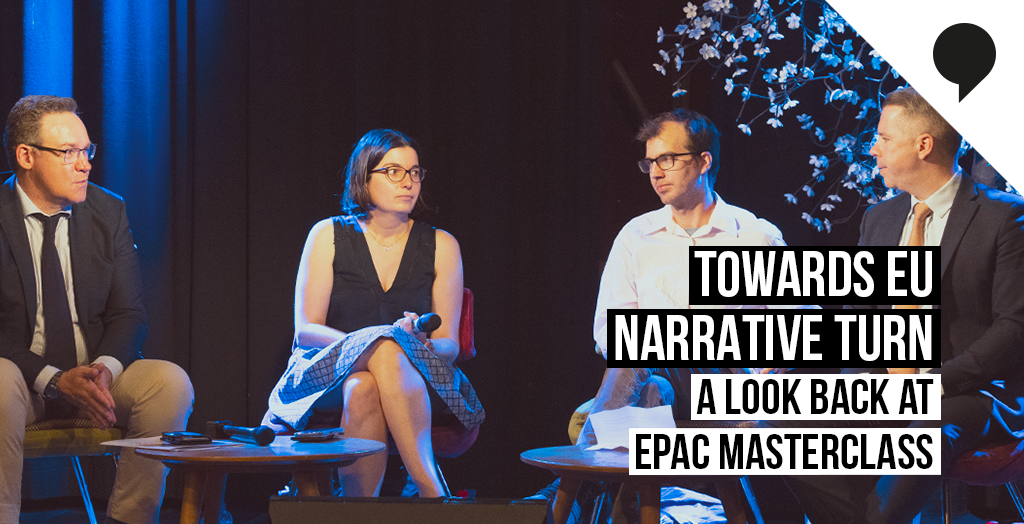The Protagoras Masterclass “The Communication of EU Power: towards a narrative turn”, organised by students of the EPAC programme in collaboration with IHECS Academy and Protagoras, was a lively meeting point for experts on EU affairs with the IHECS community and beyond, EU institution officials, students, and all those interested in EU communication. On the 8th of June the participants had the opportunity to meet in Brussels for a hybrid debate (via Twitch) on the global power of the EU through public communication campaigns targeting its citizens.
The event was moderated by Nicolas Baygert, Director of Think-Tank Protagoras, who was joined by esteemed panellists Olivier Le Saëc, Administrator at the EU Parliament and former Political Adviser on External Affairs at the EU Parliament, Camille Gessant, Deputy Editor-in-Chief at Agence Europe, specialist on EU External Affairs and Alvaro Oleart, Postdoctoral Researcher at Cevipol/IEE (ULB). We had the pleasure to welcome around 40 registered participants, both in person and online.
Nicolas Baygert started the discussion by asking whether we really are witnessing a shift in the communication of the EU institutions and whether the institutions want to have a major influence on the global stage. Our panellists confirmed that the EU institutions have become more popular and engaged in discussions with citizens in the last decade and that nowadays, thanks to social media and together with 27 EU leaders, they can easily carry out a debate with the public. Camille Gessant made an interesting point and mentioned that the institutions should use journalists as another communication channel to convey messages to the citizens as ‘tweets explaining different things’ are not enough to answer questions on the complexities of EU policies to the public.
Olivier Le Saëc mentioned that we are in a ‘political game within the European political system’ and that ‘we have to think complexity’ when referring to the communicative power of the EU institutions. Having different political systems and shared competencies means that the EU does not operate as one block, added Alvaro Oleart.
So will this complexity be understood by non-Brussels based entities? It was stressed by Camille Gessant that the institutions should work hand-in-hand in order to avoid situations like the so-called ‘Sofagate’ because the public needs to see that the EU works as an integral body on the international level. On the contrary, Alvaro Oleart mentioned that the EU should not speak in one voice at the international stage. He underlined that the EU should not communicate in a uniform, corporate manner, but should benefit from a more pluralistic way of conveying its messages because we are all different.
As the discussion went further, it was noted by Olivier le Saëc that Europeans are more used to fighting each other than collaborating and that the EU should be a place for discussion because we do not want to move from complexity in communication to chaos. Light was shed on the upcoming EU parliamentary elections in 2024 and the communication campaign that is now in the hands of the European Parliament. ‘Is there a democratic issue then because communication is handled by the political parties?’ Nicolas Baygert continued the debate. Camille Gessant again stressed the importance of the presence of journalists in Brussels working on EU affairs because they are a bridge between a Brussels political scene and Member States.
The debate was followed by questions on EU citizens’ perceptions of the engagement in the upcoming elections and an observation was made that the public outside of Brussels does not know what the EU really is (according to a recent Barometer study). Moreover, the audience noticed that space should be given to voices from Eastern European countries as we can only hear: Macron this, Meloni that and Sánchez there. What is the solution then? As rightly noted by Olivier le Saëc, communication on the EU is a shared responsibility and should be primarily led by the national parliaments.
The event was not only just talking and questions. The debate was followed by a networking drink shared between the panellists and the audience at Loft58. We are grateful to our sponsors GOPA and PROTAGORAS for making our event such a great success!
The full report of the event can be found on this link.
